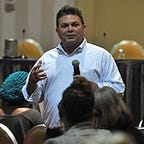The cold dead hand of the past
Speedchange.at.medium
As Mark Sonnemann wrote, neither “21st Century Skills” nor “21st Century Challenges” are anything new, but opinion books and consultant careers are launched by telling people that the times are changing, because that goes down easier than saying, “Your behavior has made you dead weight.”
Because of my age I can remember not just Bill Clinton telling America that it must build a “Bridge to the 21st Century,” but also — well not directly but in hearing first hand memories — of America’s first president “born in this [the 20th] Century.” And in 1996 we didn’t really begin building that bridge, and we certainly, as functional societies — US, UK, not even EU — never really tried to cross that divide. That is we never actually embraced the ideas — either in 1960 (JFK’s election in the US), or at the turn of the current Century — that new technologies might offer truly new ways to begin to solve old problems.
Especially in education.
The problems of global population balance shifts, of old boundaries, of limited resources, of income inequality, of the communities and the world that surround us, could have been the work of education for all time. I went to a high school in the 1970s where this was true — a high school begun by Neil Postman and Alan Shapiro — and like similar high schools throughout the US and UK, “schools without walls,” my high school was stunningly successful in developing what turned out to be future skills.
If students knew how to use 20th Century media to, say, force our school district to begin buying only United Farm Workers picked produce (a 70s issue), those students turned out to know how to use emerging media forms decades later. If we knew how to interview homeless persons living beneath Grand Central, we knew how to listen to diverse voices decades later. If we knew how to work within — while watching — a city’s redevelopment office, we knew something about the levers of economic urban power from the 1980s appearance of gentrification to today.
So the problem is never time-bound, rather it is the cold, dead hand of the past — the refusal to accept the discomfort of change — that traps us. In 1960 it was still a radical idea that America could have a President who didn’t remember the McKinley Administration, as if someone born into the age of radio — of broadcasting — was inherently untrustworthy. Today it becomes a radical idea that kids get to use their phones in schools — God forbid go online without filters — and so we argue the ridiculous rather than embrace opportunity.
Get over it, everyone. If we can take one thing from this nightmare year in the US and UK it must be that the way we do things has failed.
And when what you do has failed you need to do something different.
- Ira Socol
